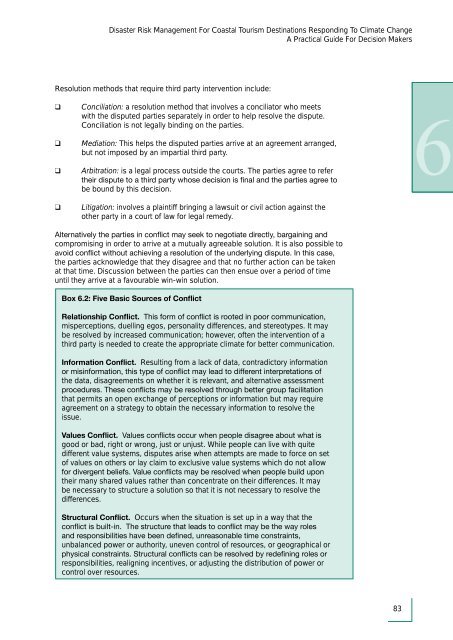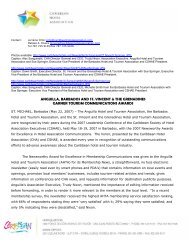Disaster Risk Management for Coastal Tourism - Caribbean Hotel ...
Disaster Risk Management for Coastal Tourism - Caribbean Hotel ...
Disaster Risk Management for Coastal Tourism - Caribbean Hotel ...
Create successful ePaper yourself
Turn your PDF publications into a flip-book with our unique Google optimized e-Paper software.
<strong>Disaster</strong> <strong>Risk</strong> <strong>Management</strong> For <strong>Coastal</strong> <strong>Tourism</strong> Destinations Responding To Climate Change<br />
A Practical Guide For Decision Makers<br />
Resolution methods that require third party intervention include:<br />
<br />
<br />
<br />
<br />
Conciliation: a resolution method that involves a conciliator who meets<br />
with the disputed parties separately in order to help resolve the dispute.<br />
Conciliation is not legally binding on the parties.<br />
Mediation: This helps the disputed parties arrive at an agreement arranged,<br />
but not imposed by an impartial third party.<br />
Arbitration: is a legal process outside the courts. The parties agree to refer<br />
<br />
be bound by this decision.<br />
Litigation: involves a plaintiff bringing a lawsuit or civil action against the<br />
other party in a court of law <strong>for</strong> legal remedy.<br />
6<br />
<br />
compromising in order to arrive at a mutually agreeable solution. It is also possible to<br />
<br />
the parties acknowledge that they disagree and that no further action can be taken<br />
at that time. Discussion between the parties can then ensue over a period of time<br />
until they arrive at a favourable win-win solution.<br />
<br />
<br />
misperceptions, duelling egos, personality differences, and stereotypes. It may<br />
be resolved by increased communication; however, often the intervention of a<br />
third party is needed to create the appropriate climate <strong>for</strong> better communication.<br />
Resulting from a lack of data, contradictory in<strong>for</strong>mation<br />
<br />
the data, disagreements on whether it is relevant, and alternative assessment<br />
<br />
that permits an open exchange of perceptions or in<strong>for</strong>mation but may require<br />
agreement on a strategy to obtain the necessary in<strong>for</strong>mation to resolve the<br />
issue.<br />
<br />
good or bad, right or wrong, just or unjust. While people can live with quite<br />
different value systems, disputes arise when attempts are made to <strong>for</strong>ce on set<br />
of values on others or lay claim to exclusive value systems which do not allow<br />
<br />
their many shared values rather than concentrate on their differences. It may<br />
be necessary to structure a solution so that it is not necessary to resolve the<br />
differences.<br />
Occurs when the situation is set up in a way that the<br />
<br />
<br />
unbalanced power or authority, uneven control of resources, or geographical or<br />
<br />
responsibilities, realigning incentives, or adjusting the distribution of power or<br />
control over resources.<br />
83








